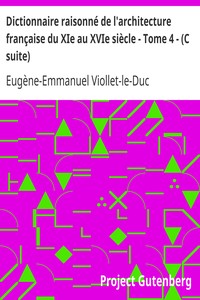Dictionnaire raisonné de l'architecture française du XIe au XVIe siècle - Tome…
"Le Dictionnaire raisonné de l'architecture française du XIe au XVIe siècle - Tome IV" by Eugène Viollet-le-Duc is an architectural reference work written in the 19th century. This comprehensive treatise delves into the principles of French architecture, exploring the evolution of construction techniques and styles from the medieval period to the Renaissance. The book likely spans a wealth of architectural knowledge, detailing various forms, elements, and methodologies used in structures throughout this
significant historical timeframe. At the start of the volume, the author introduces foundational concepts surrounding construction as both a science and an art, emphasizing the necessity of understanding materials in relation to their properties and the needs of society. Viollet-le-Duc contrasts the construction principles used by the Greeks and Romans, highlighting how these ancient practices laid the groundwork for architectural advancements in the medieval era. He discusses the challenges posed by societal changes following the Roman Empire's decline, specifically focusing on the adaptation and innovation required by builders during the early Middle Ages. The opening sets a thorough groundwork for understanding the transition from ancient techniques to those developed in the medieval period, hinting at the intricacies of architectural practice that will be elaborated upon in subsequent sections. (This is an automatically generated summary.)
Read or download for free
| How to read | Url | Size | |||
|---|---|---|---|---|---|
| Read now! | https://www.gutenberg.org/ebooks/30784.html.images | 954 kB | |||
| EPUB3 (E-readers incl. Send-to-Kindle) | https://www.gutenberg.org/ebooks/30784.epub3.images | 9.1 MB | |||
| EPUB (older E-readers) | https://www.gutenberg.org/ebooks/30784.epub.images | 9.1 MB | |||
| EPUB (no images, older E-readers) | https://www.gutenberg.org/ebooks/30784.epub.noimages | 394 kB | |||
| Kindle | https://www.gutenberg.org/ebooks/30784.kf8.images | 20.3 MB | |||
| older Kindles | https://www.gutenberg.org/ebooks/30784.kindle.images | 20.3 MB | |||
| Plain Text UTF-8 | https://www.gutenberg.org/ebooks/30784.txt.utf-8 | 889 kB | |||
| Download HTML (zip) | https://www.gutenberg.org/cache/epub/30784/pg30784-h.zip | 9.4 MB | |||
| There may be more files related to this item. | |||||
Similar Books
About this eBook
| Author | Viollet-le-Duc, Eugène-Emmanuel, 1814-1879 |
|---|---|
| Title | Dictionnaire raisonné de l'architecture française du XIe au XVIe siècle - Tome 4 - (C suite) |
| Credits |
Produced by Michel Laglasse, Rénald Lévesque and the Online Distributed Proofreaders Europe at http://dp.rastko.net. |
| Reading Level | Reading ease score: 56.6 (10th to 12th grade). Somewhat difficult to read. |
| Language | French |
| LoC Class | NA: Fine Arts: Architecture |
| Subject | Architecture -- France |
| Subject | Architecture -- Dictionaries |
| Category | Text |
| EBook-No. | 30784 |
| Release Date | Dec 28, 2009 |
| Copyright Status | Public domain in the USA. |
| Downloads | 274 downloads in the last 30 days. |
| Project Gutenberg eBooks are always free! | |

